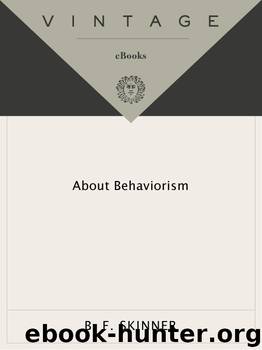About Behaviorism by B.F. Skinner

Author:B.F. Skinner [Skinner, B. F.]
Language: eng
Format: epub
ISBN: 978-0-307-79784-1
Publisher: Knopf Doubleday Publishing Group
Published: 2011-06-07T16:00:00+00:00
Reasoning
II: DEDUCTION
It is not the object of a behavioral analysis to say what induction is. Like reasoning or inference, the term does not usefully describe any single behavioral process. Nevertheless, finding, offering, or inventing reasons loosely defines a field which may be profitably analyzed. A pigeon pecks a disk and is reinforced when the disk is red but not when it is green; it then stops pecking when the disk is green. We do not need to say that it has drawn the inference that green disks are not worth pecking. A baseball aficionado goes to the ball park on clear days but not when it is raining heavily. We do not need to say that on a given rainy day he infers that no game will be played. If he is planning to watch a televised game played in another city and hears that it is raining there, he may not turn on his television set, but we have no reason to say that he has inferred that a game will not be played. We need a separate term only to describe the deriving of a rule from the contingencies. The pigeon cannot do this, but the aficionado can “reason from particulars to generals” in saying, “Baseball is not played in heavy rain.”
Deduction, as reasoning from generals to particulars, is also not a process requiring a behavioral analysis, but there is a field having to do with the control exerted by rules which needs attention. If someone who knows nothing about baseball is told that games are never played in heavy rain and that it is raining heavily, what behavioral process or processes will keep him from going to the ball park or will lead him to say that no game will be played? It is tempting to make a rough distinction between induction as the deriving of rules and deduction as the applying of rules, but this would be to overlook the fact that deduction is often a matter of deriving new rules from old, particularly from a consideration of certain key terms, such as “all,” “some,” “no,” “if,” and “or,” where the discovery of rules for deriving new rules from old would seem to be an example of induction.
This is not the place for a survey of reasoning. I am simply trying to suggest the kinds of behavioral processes to be found in these traditional fields. It has often been pointed out that a logical or mathematical formulation follows a great intellectual achievement rather than produces it. It has been said that
Newton could hold a problem in his mind for hours and days and weeks until it surrendered to him its secret. Then, being a supreme mathematical technician, he could dress it up, how you will, for the purposes of exposition, but it was his intuition which was preeminently extraordinary—“so happy in his conjectures,” said de Morgan “as to seem to know more than he could possibly have any means of proving.”
The extraction of rules was evidently a secondary stage.
Download
This site does not store any files on its server. We only index and link to content provided by other sites. Please contact the content providers to delete copyright contents if any and email us, we'll remove relevant links or contents immediately.
| Behaviorism | Cognitive Behavioral Therapy |
| Existential | Gestalt |
| Humanistic | Jungian |
| Psychoanalysis | Transpersonal |
The Art of Thinking Clearly by Rolf Dobelli(8836)
The 5 Love Languages: The Secret to Love That Lasts by Gary Chapman(8482)
Mindhunter: Inside the FBI's Elite Serial Crime Unit by John E. Douglas & Mark Olshaker(7831)
Becoming Supernatural by Dr. Joe Dispenza(7100)
Nudge - Improving Decisions about Health, Wealth, and Happiness by Thaler Sunstein(6629)
The Road Less Traveled by M. Scott Peck(6627)
Enlightenment Now: The Case for Reason, Science, Humanism, and Progress by Steven Pinker(6404)
Win Bigly by Scott Adams(6306)
Mastermind: How to Think Like Sherlock Holmes by Maria Konnikova(6228)
The Way of Zen by Alan W. Watts(5790)
Factfulness: Ten Reasons We're Wrong About the World – and Why Things Are Better Than You Think by Hans Rosling(4016)
The State of Affairs by Esther Perel(3920)
Gerald's Game by Stephen King(3913)
Man's Search for Meaning by Viktor Frankl(3623)
The Confidence Code by Katty Kay(3562)
Thinking in Bets by Annie Duke(3528)
Enlightenment Now by Steven Pinker(2911)
The Worm at the Core by Sheldon Solomon(2910)
Liar's Poker by Michael Lewis(2806)
